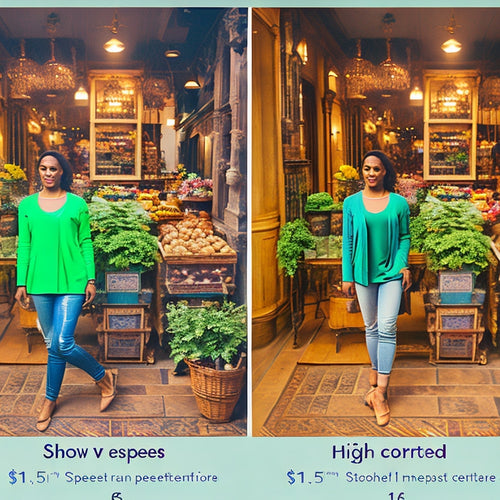
E-learning Shopping Trends in Great Britain
Share
The e-learning market in Great Britain is experiencing significant growth, driven by a shift towards online learning resources. In 2019, 23.1% of men and 20.5% of women aged 25-34 purchased e-learning materials online. This trend is fueled by demand for flexible and convenient learning, with providers adapting competitive pricing strategies. Popular subjects include computer science and business studies. The market is expected to continue growing, driven by convenience and flexibility. To stay ahead, e-learning providers must adapt to changing consumer preferences. For a deeper understanding of the emerging trends shaping the UK's e-learning landscape, explore the latest insights and data.
Key Takeaways
• In 2019, 44% of individuals in Great Britain purchased e-learning materials online, driven by convenience and flexibility.
• The demand for flexible and convenient learning fuels the growth in sales of e-learning materials in Great Britain.
• Providers are adopting competitive pricing strategies to cater to the increasing demand for online learning resources.
• Popular subjects among e-learning shoppers in Great Britain include computer science and business studies.
• The trend of purchasing e-learning materials online is expected to continue, with a significant share of individuals preferring mobile-first learning platforms.
British E-Learning Market Overview
In Great Britain, the e-learning market has witnessed significant growth, with a notable segment of the population, particularly among certain age and gender groups, actively purchasing e-learning materials online. A 2019 survey revealed that 23.1% of men and 20.5% of women aged 25-34 had bought online learning resources.
This trend is indicative of a shifting paradigm in the way people consume educational content, with e-learning emerging as a preferred mode of learning. An e-learning market analysis reveals that the industry has been experiencing steady growth trends, driven by increasing demand for online courses and resources.
As the market continues to evolve, it will be interesting to see how e-learning industry growth trends shape the future of education in Great Britain.
Online Learning Platforms in UK
The growth of the e-learning market in Great Britain has led to an increase in the number of online learning platforms available to learners, with popular platforms such as FutureLearn and Coursera offering a range of courses and resources from top UK universities. These platforms provide learners with access to virtual classrooms, digital resources, and flexible learning options, making it easier for individuals to upskill or reskill at their own pace.
Here are some key features of online learning platforms in the UK:
-
Virtual classrooms: allowing learners to interact with instructors and peers in real-time.
-
Digital resources: providing access to a vast library of e-books, videos, and other learning materials.
-
Personalized learning: enabling learners to tailor their learning experience to suit their needs and goals.
- Mobile optimization: allowing learners to access courses and resources on-the-go.
E-Learning Materials Sales Trends
Driven by the growing demand for online learning, e-learning materials sales have experienced significant growth in Great Britain, with a notable increase in the share of individuals purchasing these materials online.
This upward trend is largely fueled by consumer preferences for flexible and convenient learning solutions. Regarding market growth, e-learning materials have become a lucrative business, with providers adopting competitive pricing strategies to capture a larger market share.
Notably, popular subjects such as computer science and business studies have seen the highest demand for e-learning materials. As the market continues to expand, it will be intriguing to see how providers adapt to changing consumer preferences and develop innovative solutions to meet the evolving needs of online learners.
UK Students' Digital Preferences
British students' digital preferences play a significant role in shaping the e-learning landscape in the UK. There is a growing inclination towards online resources and digital tools that facilitate flexible and personalized learning experiences. This shift is driven by the need for student engagement and the recognition of diverse learning styles.
Here are four key digital preferences of UK students:
-
Mobile-first approach: Students prefer learning platforms that are optimized for mobile devices, allowing them to learn on-the-go.
-
Interactive content: Engaging multimedia content, such as videos and gamification, is preferred over traditional text-based materials.
-
Personalized learning paths: Students want learning experiences that are tailored to their individual needs and learning styles.
- Real-time feedback: Instant feedback and assessment are essential for students to track their progress and stay motivated.
Online Course Purchasing Behavior
UK students' online course purchasing behavior is largely influenced by their digital preferences, with 44% of individuals in Great Britain purchasing e-learning materials online in 2019, and this trend is expected to continue.
This behavior is a key aspect of consumer behavior, driven by the convenience and flexibility that online courses offer.
A market analysis reveals that the e-learning market is growing, with more students turning to online platforms to acquire new skills and knowledge.
As a result, e-learning providers must adapt to these changing consumer preferences, offering engaging and accessible content that meets the demands of the modern learner.
Frequently Asked Questions
What Is the Average Cost of Online Courses in Great Britain?
The elusive answer to online course costs in Great Britain! While exact figures vary, e-learning affordability is a concern; a cost comparison of platforms reveals an average course price of £200-£500, with some options dipping as low as £20.
Are E-Learning Materials Purchased More on Desktop or Mobile Devices?
When it comes to purchasing e-learning materials, device preference plays a significant role. While desktop devices offer a more all-encompassing user experience, mobile devices provide convenience, with most users opting for mobile due to its ease of use and accessibility.
Do British Students Prefer E-Learning Materials in Audio or Video Format?
As the curtain rises on the stage of learning, British students reveal their preferences: a harmonious duet of audio and video formats, with 55% opting for visual aids, citing improved retention, while 45% tune in to audio, citing ease of consumption.
Can Online Learning Platforms in Great Britain Be Integrated With Social Media?
Online learning platforms can leverage social media engagement by integrating e-learning content, fostering community building and encouraging user-generated content, while influencer marketing can amplify platform visibility, driving adoption and enhancing the overall learning experience.
Are There Any Discounts Offered for Bulk Purchases of E-Learning Materials?
When it comes to bulk purchases of e-learning materials, savvy buyers can capitalize on discount options, such as quantity discounts, to access significant savings opportunities, making online learning more accessible and affordable for a wider audience.
Related Posts
-
Enhance Shopping Experience With Shareclips: The Ultimate Shoppable Video Solution
ShareClips is a revolutionary platform that revolutionizes the shopping experience by offering a convenient and innov...
-

How to Do Shopify Optimization
Shopify optimization is a crucial aspect of achieving e-commerce success. By implementing effective strategies, onli...
-

Efficiency and Professionalism: The Power of Email Templates for Confirmations and Follow-ups
This article examines the benefits and creation of email templates for confirmations and follow-ups. Email templates...

